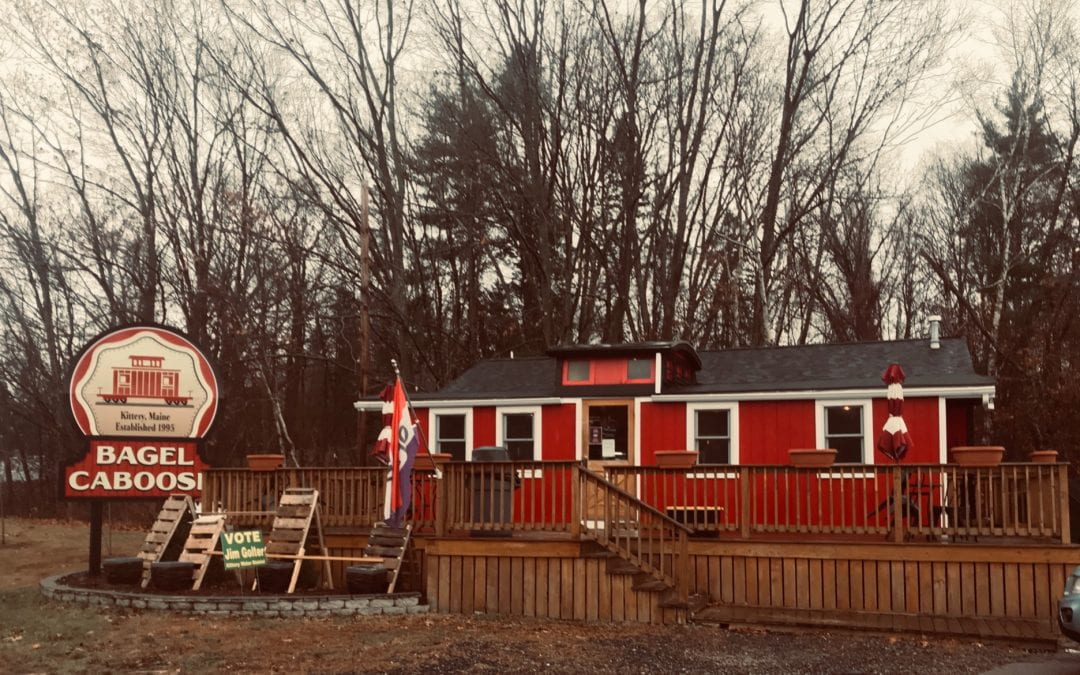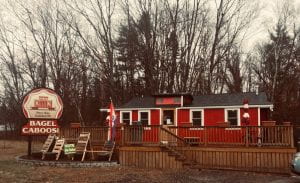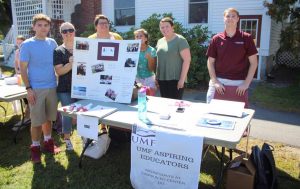
Dec 8, 2020 | Feature, TopStory |
By Cassidy Delano, Contributing Writer

Photo courtesy of Cassidy Delano
Kittery is the perfect place for a calm Sunday drive. It is a small town in southern Maine that sits on the Atlantic Coast.
I have lived in the same house in Kittery my entire life, and my Sunday drive route has never changed. It gives me a chance to visit all my favorite places in town while preparing myself for the week that lies ahead.
This seems to be a right of passage for me; growing up my dad used to take me on Sunday drives. He grew up in Kittery and was no stranger to the many secret spots that my friends and I call our own. Dad would tell me, “Just wait till you can do this on your own. Sunday drives can save a person.”
I was home for Thanksgiving and figured that a Sunday drive was just what I needed before heading back to Farmington. I started my car, and played a song that best fits today’s journey, “Sunday Best” by Surfaces. I pulled out of my driveway and turned right down the street, one stop before we truly started. I pick up my best friend who lives seconds down the road from me, Mia. Off we go to explore the best places in Kittery.
With “Sunday Best” still blaring, we pull into a local breakfast gem, Bagel Caboose, built to look like a caboose of a train. When you walk through the door, an aroma mixed with bagels and coffee fills your nose. It’s a breath of fresh air for us. “They have the best coffee in town, and their breakfast sandwiches are even better,” Mia said. Bagel Caboose is the place to go when you’re not looking for a sit-down breakfast. Grab a coffee, bagel, breakfast sandwich, or bakery item of your choice and you can be on your way.
“Today I ordered a North Ender on an english muffin, and a hot hazelnut coffee,” Mia said. “A classic Sunday drive meal.” The North Ender is filled with spinach, cheese, egg, tomato, and tons of pesto.
I ordered my usual bacon egg and cheese on a wheat everything bagel with hollandaise sauce, accompanied by a hazelnut iced coffee.
We hop back in the car and are on our way to our next destination, Seapoint Beach, a fan favorite, as it’s a small sandy beach in what’s known as Kittery Point.
Seapoint is about a ten-minute drive from Bagel Caboose, giving us plenty of time to jam to music and enjoy the seaside view.
As we approach Gerrish Island bridge on the right, we stay straight and pass it, this road leads right to Seapoint. The road feels long, as Mia turns up the volume to another classic Sunday drive tune, “Where Is The Love” by the Black Eyed Peas.
Finally, the beach comes into view as you turn on the sharp corner of the road. Only three cars are parked down here, we pull up to the front row, with a perfect view of the water. We turn down the music, roll down the windows, and enjoy the fresh ocean breeze.
“This is what home smells like,” Mia said, as she took a deep breath in. Seapoint beach is where we live during our summer vacation.
Seapoint Beach feels like a perfect place any time of the year. In the spring and summer season it’s the perfect place to swim, have fires on the beach, and watch the sunset. In the fall it’s overtaken by dogs trying to get in the last bits of the warm weather, with friends and family soaking up the last fireside warmth the beach will see. Once winter hits, Seapoint is the perfect place to watch the waves from the recent storm.
“If you come to Kittery and don’t visit Bagel Caboose or Seapoint Beach, you’re not doing it right,” Mia said.
We sit here peacefully with the soft tunes of music and crashing of waves surrounding us. The Sunday drive feels complete, and the only path left is back home. Neither of us want to leave, but know Seapoint will be waiting for us when we come home again.
“Till the next Sunday drive,” Mia said.

Sep 22, 2017 | Feature |
By Gavin Elliott – Contributing Write
After the recent name change approved by Student Senate, UMF Aspiring Educators, previously known as Student M.E.A. (Maine Education Association), seem to be growing in popularity.
Last year, the UMF Aspiring Educators were down to seven to ten members. The level of involvement was higher in the past, according to Beth Evans, a professor at UMF and faculty advisor for Aspiring Educators.
“When I first started teaching here at UMF around 20 years ago, just about every undergrad Ed Major was a member of at least one of the two education clubs,” Evans said.
This year at the first meeting, numbers had tripled when compared to the amount of members last year. This success is partially due to the club’s recent name change.

UMF Aspiring Educators of Maine at the Fall 2017 Club Fair
(Photo by Mitchell Agailb)
According to Stephen Riitano, the president of the Aspiring Educators, “the change was to align with the N.E.A. (National Education Association),” and to “let the students of UMF know that a membership to the student M.E.A. is not necessary, although UMF Aspiring Educators is still affiliated [with them].”
Aspiring Educators also held an Informational Meeting in the Ed Center along with Advocates for Disability Awareness Club (ADAC) and UMF Association for the Education of Young Children (AEYC). Through this meeting, the members of it are very much clubs hoped to inform new students, as well as current students, of what they each do.
Members of Aspiring Educators will often find themselves brainstorming and discussing upcoming events, fundraising, looking at poverty’s impacts on schools, connecting with other educators and learning skills they may not typically receive in their regular classrooms to aid in their professional development.
Professor Evans elaborated, “It is imperative to know what everyone else is doing in this profession. Early childhood to middle to special ed, etc. and this club does a great job of preparing ed students to do just this.”
Evans went on to say “The club is great because the movers and shakers of the professional life we call teaching.”
The treasurer of Aspiring Educators, Carson Hope, says, “The club is great because you get to network with other educators and clubs, and learn about the community part of teaching.” This networking can also impact more people by allowing them to pool their resources, said Evans.
According to Riitano, an example of the clubs pooling of their resources will be seen on September 26th when Kelly-Anne Rush, more commonly known as Crafty Teacher Lady, will be speaking at 5:30 pm in the Landing about how “teachers can be financially smart while providing meaningful and engaging lessons for their students.”
Later in October, they will be hosting Scare Fest, where “a panel of current teachers and administrators come to UMF and discuss the real side of teaching,” Riitano said.
For more information or any questions on the Aspiring Educators, like them on Facebook at “UMF Aspiring Educators of Maine,” or drop into any of their meetings on Wednesdays, room 106 of the Kalikow Education Center at 7:30 pm
Sep 22, 2017 | Feature |
By Andrew Devine – Editor-in-Chief
UMF to welcome Julian Saporiti to the Emery Community Arts Center on Tuesday, October 3rd to perform a collection of songs based on his extensive research.
Inspired by his doctoral research at Brown University, and his own experiences as a Vietnamese American growing up in Tennessee, Saporiti will perform a collection of his own songs accompanied by archival photographs and films, as well as collected stories from World War II era Japanese Internment Camps.
The internment of Japanese Americans during World War II was the forced relocation and incarceration of between 110,000 and 120,000 people of Japanese ancestry as ordered by President Franklin D. Roosevelt shortly after Imperial Japan’s attack on Pearl Harbor.
In an email interview, Saporiti wrote “Coming from a family of immigrants, I wanted to focus on a dissertation project which illuminated complicated American histories while also speaking to the present moment filled with racial fear, immigration bans, intolerance, and political divide.”
The project is titled “No No Boy” as a tribute to The “No-No Boys” which are reported as being Japanese-Americans who during WWII refused to swear allegiance to the US government or be drafted while their families and friends were locked away in concentration camps on Saporiti’s web-page.
The web-page/blog serves as a companion to the No-No Boy project by posting pictures, music, and other media, as well as interviews and articles which have inspired the album and informed Saporiti’s scholarship.
Saporiti formerly performed in a successful indie rock band, the Young Republic, consisting of himself and various musicians, including Nate Underkuffler. Luanne Yetter -mother to Nate and advisor to the Farmington Flyer – pushed the band to perform in the Farmington area and Saporiti to bring his project here as well.
In an interview, Yetter discussed working on books, projects, and UMF courses that look at history from the perspective of art of the time period being examined; similarly to what Saporiti has done for this project.
“It’s something that Julian and I have always had in common, an interest in both history and music,” Yetter said. Saporiti has also been a guest speaker in some of her previous courses offered at UMF.
In the preview for the album found on the web page for this project, Saporiti concludes his understanding of his work in saying “Whether it’s in concert halls, museums, bars, churches, or coffee shops, performing these songs, showing these pictures, and telling these stories is important, especially right now.”
Saporiti expanded on this in saying, “I’m not talking at anyone or lecturing or writing a dense academic paper (I also do that), but with these songs, I’m just telling you stories of people I know or have read about and am trying to get people to think, and maybe think about what’s going on right now with Muslims, black folks, and undocumented Latinos and Asians.”
Saporiti will bring the presentation to numerous other colleges and venues around the northeast United States the remainder of the year. More information can be found at https://nonoboy-music.tumblr.com/about .
Saporiti will be bringing “No No Boy” to the University of Maine at Farmington in the Emery Community Arts Center on Tuesday, October 3rd at 7 pm.

Mar 9, 2017 | News |
By Angel Greer, Contributing Writer

Tyler Daigle with his fiancée, Gabrielle Severance. (Photo Courtesy of Gabrielle Severance)
Tyler Daigle, a senior history major at UMF passed away February 27th from complications related to Duchenne Muscular Dystrophy.
Duchenne Muscular Dystrophy is a genetic disorder that causes the muscles to weaken due to an absence of dystrophin, a protein that helps keep muscle cells intact. This disorder primarily affects males and progresses over time.
“Tyler was diagnosed at the age of five. He was able to walk up until he was ten. It affected every muscle in his body, including his heart,” said Tyler’s fiancée, Gabrielle Severance. Muscle weakness can begin as early as age 3, first affecting the shoulders and upper arm muscles and the muscles of the hips and thighs. By the early teens, the heart and respiratory muscles are also affected. “In the end, he was losing the use of his arms, but this didn’t stop him. He continued to go to school and complete assignments until the end,” said Severance.
“Tyler was 23 and he was a senior on his way to graduate,” said Sam O’Neal, Tyler’s CA this past year. “He was almost there. He was a smart cookie, a very smart cookie.” Tyler always knew what he wanted and did not hesitate to pursue it.
“Tyler’s favorite subject was history. He was working towards a degree in history with a minor in anthropology and political science,” said Severance.
“I loved having him in class primarily because he was so expressive,” said Nicole Kellett, Tyler’s Latin America and Anthropology professor. “I could always tell if I struck a chord with the students because Tyler would often throw his head back in laughter or shake his head back and forth in disbelief, or perhaps amazement, of what we were discussing in class,” said Kellett.
During February break, O’Neal had received a message from Susan Grace, Tyler’s mom, about him being admitted to the Hospice House in Auburn. “She didn’t really tell us much; besides that, everything was hopeful,” said O’Neal. “Everyone in Tyler’s hall and every CA in Scott itself signed a card and sent it to him while he was admitted.”
Not only was Tyler smart, but he was also kind, funny, and a great listener. “I know you kinda say this about everybody, but he was so impossibly kind to anybody…anybody and everybody that he met. Whenever he would talk you would just listen to him,” said O’Neal. “Everything he said just kinda made sense. He was very good at conversation. He loved listening to your stupid stories and he would laugh right along with you,” said O’Neal.
Tyler was strong-willed, self-sufficient, and an independent person, even while being wheelchair bound. “It didn’t matter that he was in a wheelchair because it didn’t seem like he was. He was way more independent than I’ll ever be,” said O’Neal.
“He swore that if he could walk, he’d be a wrestler,” said Severance. Tyler was a huge fan of the WWE. “He knew everyone that was in it and every move, and made up his own. He also wanted to start up a Wrestling Club,” said O’Neal. Tyler has always been actively involved here on campus and was part of a few clubs, in addition to always attending events held at the Landing.
“Tyler made UMF a better place,” said Kellett, “and I’m so grateful he chose to spend many of his formative years with us.”

Feb 17, 2017 | Feature |
By Lindsay Mower, Staff Reporter & Layout Editor

Andy Keirns, Manager of Java Joe’s (Photo by Sarah Kosowan)
If you have ever been to Java Joe’s in downtown Farmington, you’ve probably ordered your bagel with speciality cream cheese from a man wearing a plain t-shirt (occasionally a sweatshirt with a few stripes) and a pair of jeans. This is Andy Keirns. He’s most likely had a conversation with you that’s left your head spinning as you’ve reimagined your own existence in the universe, though chances are, given his humble nature, you don’t know much about Keirns himself.
Andy Keirns has been working at Java’s long enough to see more than a couple rotations of Farmington’s flux of college students. The story of the man behind the counter, established in Farmington in 2002, becomes infinitely more interesting when peering into his life outside the coffee shop: an artist, a farmer, a musician, a phenomenal writer and composer, a storyteller and an advocate for the universe; the legend of Keirns, intricate and inspirational, is a tale that must be told.
A native of Tiverton, Rhode Island, Keirns grew up with what he describes as a “relatively unmemorable childhood experience,” spending most of his time in areas of Southern Massachusetts like Fall River and New Bedford, engrossed in the hardcore metal scene that he and his friends fell into during their later teen years. Describing the ‘Technical Death Metal’ music he listened to as incorporating elements of jazz fusion and math rock to make a brutally interesting sound, Keirns added a disclaimer; “The violence that comes along with a live show is not interesting to me… Violence is stupid. The culture in a lot of ways is inherently ignorant— not the music.” Around this time in Keirns’ youth is when he started drinking alcohol. “I was just like drunk all the time. And nobody can tell when you’re 18 or 19 because that’s what kids do.”
How Keirns found himself in Farmington is rather simple: he came to study at UMF with hopes of being a social studies teacher. “I live social sciences; walking around, going to work… I live in this kind of sociological, anthropological world where I just get to observe everything and make comments about the world around me.”
Describing his struggle with academics Keirns says, “I made it to my senior year, but I was in my senior year for three years. I was not equipped for school, I wasn’t ready emotionally. I’m sure I was a pain in the ass for all my teachers and my advisors.” Transitioning into being a part time student in 2004 he started working at Java’s, until 2007 when he decided to take some time off from school. “Life was really, really hard for me… I was really depressed,” he said, “If I wasn’t at work I would be at my apartment with the shades drawn, drunk. And it continued to get worse.”
It wouldn’t be until 2012 that Keirns quit drinking. “When I finally woke up at 28 years old, I was still 18 in a lot of ways,” he said. His means of survival was to keep busy and to avoid his apartment covered in booze bottles. “Everyday after work, I’d go down to the river, I’d like speed walk the loop a couple of times and then I would sit and read a book until I could not bear to just be sitting and reading anymore,” he said, “that was how I got through the first few weeks.”
In addition to his time at Java’s, he also began working for a woman named Deborah Chadbourne who needed help on her farm in Freeman. “It’s an interesting story because it’s two people who have very, very little in common, who were brought together by her farm.” Expressing his deep admiration for Deborah given her instrumental role in his recovery, Keirns says, “It wasn’t just the soil, it was Deborah’s soil… Farming is really great for a person who was in my situation.”
With the positive impact of physical labor on his well being, Keirns also developed a new form of self expression. He decided he no longer wanted to be defined by what he wore and that he “just wanted to be,” so he cleaned his entire apartment and got a new wardrobe, featuring only plain clothes. He also began writing a concept album entitled ‘Bridges Between.’ Using a combination of software synthesizers and live performance, he developed a new sound with an “intentionally cheesy and un-self aware feel” that he dubbed ‘Theatrical Space Metal.’ Keirns’ music is the perfect tool for understanding the complexity of his own mind. ‘Bridges Between’ is a sci fi/fantasy project about an interdimensional alien who realizes it’s not only sentient, but capable of altering the fabric of reality and creating universal empathy and utopia by connecting the global community under a single consciousness, with the intention of evolving humanity to be closer to god. “It’s a work in progress,” Keirns says, “It’s not just an idea. It’s something I got very, very far into.”
Today, this is the story Keirns has to tell. “I can’t shut my mouth about the drinking, the alcohol and about my experience with getting sober,” he said with slight laugh, “it’s just unfortunately how I define myself.” Expressing his gratitude for never being fired from Java’s through his struggle with alcohol addiction, he says he still creates music, a gift that sobriety has granted him, although it’s currently on hold while the house he just bought is under renovation. Unabashedly admitting that he’s still learning, he says, “Now I have to live in the same community that I used to live in, trying to prove to myself and the world around me that I am not who I was.”
Keirns tried finishing school by taking one class at a time, but with only three classes remaining he never did graduate; today finishing school is not on his agenda. “My college education in some ways, I guess, was a waste,” he said, “but everything that has happened has led us to where we are.”
Keirns isn’t your average (Java) Joe; he has seen a lot go down in this tiny Western Maine town. His story needs to be heard, especially by the ears of all millennials finding themselves in a drinking culture that disregards alcohol abuse as a serious and realistic health issue; in particular, the dangers of binge drinking. His voice is that of a complex American hero, one of many facing common hurdles of the modern age, but more importantly his is the voice of one who has pulled their life together and is now reaching out to share their story with others.
As you thank him for ringing up your cup of coffee in the morning, make sure to take the time to absorb and appreciate the gems of wisdom within each story he gifts you. After all, as Keirns likes to say, “We take for granted things that are supposed to be.”




